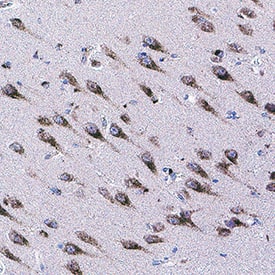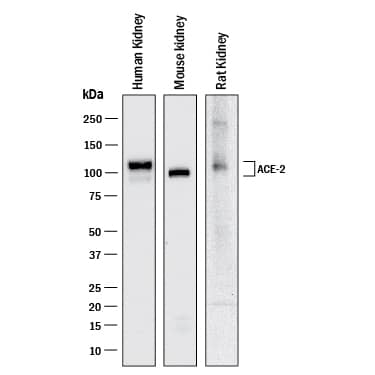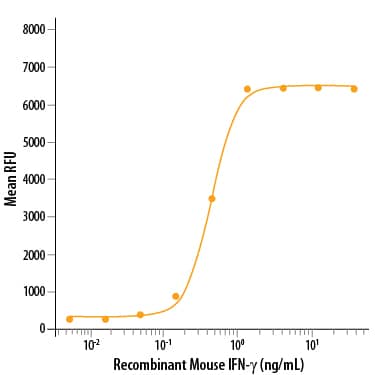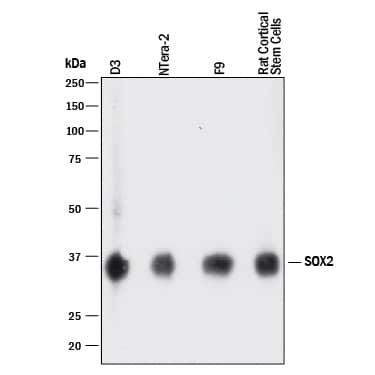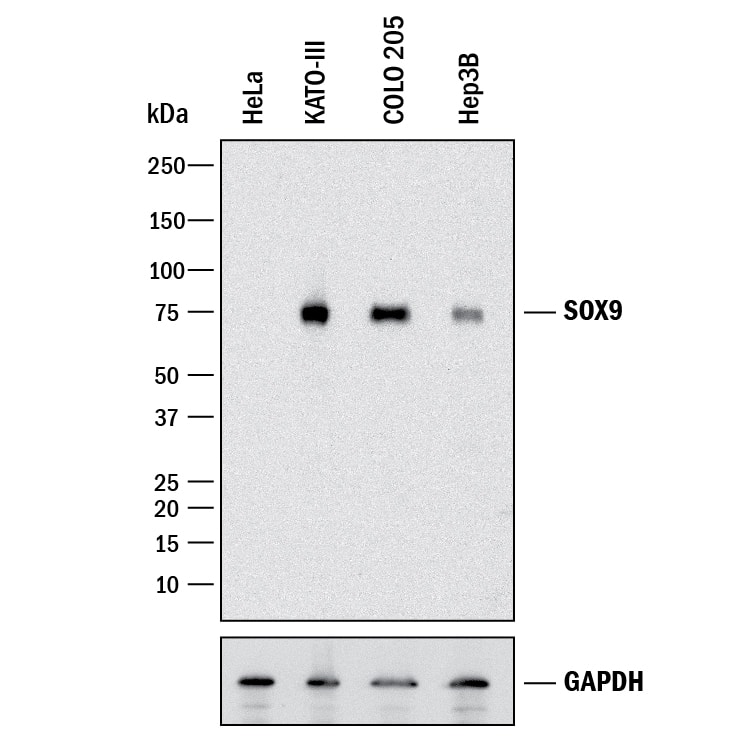Human Caveolin-1 Antibody Summary
Ser2-Ser104
Accession # Q03135
Customers also Viewed
Applications
Please Note: Optimal dilutions should be determined by each laboratory for each application. General Protocols are available in the Technical Information section on our website.
Scientific Data
 View Larger
View Larger
Detection of Human Caveolin‑1 by Western Blot. Western blot shows lysates of HUVEC human umbilical vein endothelial cells, A431 human epithelial carcinoma cell line, and A549 human lung carcinoma cell line. PVDF Membrane was probed with 0.2 µg/mL of Goat Anti-Human Caveolin-1 Antigen Affinity-purified Polyclonal Antibody (Catalog # AF5736) followed by HRP-conjugated Anti-Goat IgG Secondary Antibody (Catalog # HAF109). Specific bands were detected for Caveolin-1 at approximately 21 to 24 kDa (as indicated). This experiment was conducted under reducing conditions and using Immunoblot Buffer Group 1.
 View Larger
View Larger
Caveolin‑1 in Human Liver. Caveolin-1 was detected in immersion fixed paraffin-embedded sections of human liver using Goat Anti-Human Caveolin-1 Antigen Affinity-purified Polyclonal Antibody (Catalog # AF5736) at 10 µg/mL overnight at 4 °C. Before incubation with the primary antibody, tissue was subjected to heat-induced epitope retrieval using Antigen Retrieval Reagent-Basic (Catalog # CTS013). Tissue was stained using the Anti-Goat HRP-DAB Cell & Tissue Staining Kit (brown; Catalog # CTS008) and counterstained with hematoxylin (blue). Specific staining was localized to endothelial cells in bile canaliculi. View our protocol for Chromogenic IHC Staining of Paraffin-embedded Tissue Sections.
 View Larger
View Larger
Detection of Human Caveolin‑1 by Simple WesternTM. Simple Western lane view shows lysates of HUVEC human umbilical vein endothelial cells and A431 human epithelial carcinoma cell line, loaded at 0.2 mg/mL. A specific band was detected for Caveolin-1 at approximately 29 kDa (as indicated) using 2 µg/mL of Goat Anti-Human Caveolin-1 Antigen Affinity-purified Polyclonal Antibody (Catalog # AF5736) followed by 1:50 dilution of HRP-conjugated Anti-Goat IgG Secondary Antibody (Catalog # HAF109). This experiment was conducted under reducing conditions and using the 12-230 kDa separation system.
 View Larger
View Larger
Western Blot Shows Human Caveolin‑1 Specificity by Using Knockout Cell Line. Western blot shows lysates of HeLa human cervical epithelial carcinoma parental cell line and Caveolin-1 knockout HeLa cell line (KO). PVDF membrane was probed with 0.2 µg/mL of Goat Anti-Human Caveolin-1 Antigen Affinity-purified Polyclonal Antibody (Catalog # AF5736) followed by HRP-conjugated Anti-Goat IgG Secondary Antibody (Catalog # HAF017). A specific band was detected for Caveolin-1 at approximately 25 kDa (as indicated) in the parental HeLa cell line, but is not detectable in knockout HeLa cell line. GAPDH (Catalog # AF5718) is shown as a loading control. This experiment was conducted under reducing conditions and using Immunoblot Buffer Group 1.
Preparation and Storage
- 12 months from date of receipt, -20 to -70 °C as supplied.
- 1 month, 2 to 8 °C under sterile conditions after reconstitution.
- 6 months, -20 to -70 °C under sterile conditions after reconstitution.
Background: Caveolin-1
Caveolin-1 is a palmitoylated 22 kDa membrane-associated protein in caveolae which are cholesterol-rich invaginations in the plasma membrane involved in vesicular transport and the regulation of lipid rafts and signal transduction. Caveolin-1 expression is dysregulated during cancer progression and exhibits both positive and negative effects on tumor progression. The central region of Caveolin-1 (aa 105 - 125) is buried in the lipid layer, while the N- and C-terminal flanking regions are exposed to the cytoplasm and interact with many other proteins. Alternate splicing in human, mouse, and rat Caveolin-1 generates an isoform with a deletion of the
N-terminal 31 residues.
Product Datasheets
Citations for Human Caveolin-1 Antibody
R&D Systems personnel manually curate a database that contains references using R&D Systems products. The data collected includes not only links to publications in PubMed, but also provides information about sample types, species, and experimental conditions.
6
Citations: Showing 1 - 6
Filter your results:
Filter by:
-
Differential Effects of Caveolin-1 and -2 Knockdown on Aqueous Outflow and Altered Extracellular Matrix Turnover in Caveolin-Silenced Trabecular Meshwork Cells
Authors: Mini Aga, John M. Bradley, Rohan Wanchu, Yong-feng Yang, Ted S. Acott, Kate E. Keller
Investigative Opthalmology & Visual Science
-
Polarized Mechanosensitive Signaling Domains Protect Arterial Endothelial Cells Against Inflammation
Authors: Hong, SG;Ashby, JW;Kennelly, JP;Wu, M;Chattopadhyay, E;Foreman, R;Tontonoz, P;Turowski, P;Gallagher-Jones, M;Mack, JJ;
bioRxiv : the preprint server for biology
Species: Human
Sample Types: Whole Cells
Applications: Proximity Ligation Assay (PLA), Immunocytochemistry -
Differences in the expression of caveolin-1 isoforms in cancer-associated and normal fibroblasts of patients with oral squamous cell carcinoma
Authors: S. Kaya, Nadine Wiesmann, J. Goldschmitt, M. Krüger, B. Al-Nawas, J. Heider
Clinical Oral Investigations
Species: Human
Sample Types: Cell Lysates
Applications: Western Blot -
Proteomics analysis of colon cancer progression
Authors: S Saleem, S Tariq, I Aleem, Sadr-Ul Sh, M Tahseen, A Atiq, S Hassan, M Abu Bakar, S Khattak, AA Syed, AH Ahmad, M Hussain, MA Yusuf, C Sutton
Clin Proteomics, 2019-12-28;16(0):44.
Species: Human
Sample Types: Tissue Homogenates
Applications: Western Blot -
Snail-Induced Epithelial-to-Mesenchymal Transition Enhances P-gp-Mediated Multi Drug Resistance in HCC827 Cells
Authors: T Tomono, K Yano, T Ogihara
J Pharm Sci, 2017-03-18;0(0):.
Species: Human
Sample Types: Cell Lysates
Applications: Western Blot -
Differences in the expression of caveolin-1 isoforms in cancer-associated and normal fibroblasts of patients with oral squamous cell carcinoma
Authors: S. Kaya, Nadine Wiesmann, J. Goldschmitt, M. Krüger, B. Al-Nawas, J. Heider
Clinical Oral Investigations
FAQs
No product specific FAQs exist for this product, however you may
View all Antibody FAQsIsotype Controls
Reconstitution Buffers
Secondary Antibodies
Reviews for Human Caveolin-1 Antibody
There are currently no reviews for this product. Be the first to review Human Caveolin-1 Antibody and earn rewards!
Have you used Human Caveolin-1 Antibody?
Submit a review and receive an Amazon gift card.
$25/€18/£15/$25CAN/¥75 Yuan/¥2500 Yen for a review with an image
$10/€7/£6/$10 CAD/¥70 Yuan/¥1110 Yen for a review without an image


